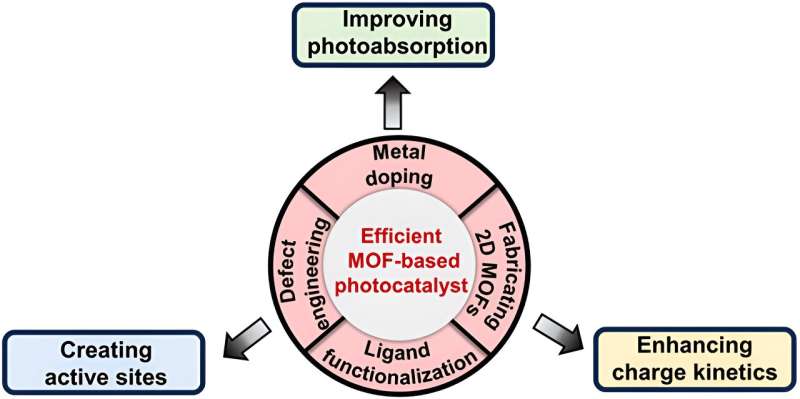
The ever-increasing global energy shortage and the worsening of the environment urgently require the substitution of conventional fossil-based energy for green and sustainable energy.
As one of the renewable energy sources, solar energy is clean and abundant and can be a satisfying option. Photocatalysis is a highly promising technology that effectively transforms solar energy into chemical energy. This technology has numerous applications, such as water splitting, CO2 reduction, organic synthesis, and pollutant degradation.
Although inorganic semiconductors are the initial and the most widely studied photocatalysts, metal-organic frameworks (MOFs), a class of porous crystalline material constructed from metal ions/clusters interconnected with multi-dentated organic ligands, are recently emerging as a new type of promising photocatalysts.
The easily regulated composition and structure of the MOFs due to their high structure inclusiveness enables MOFs to be an ideal model system to explore the composition-structure-activity relationship in a MOF-based photocatalytic system, which can provide guidance for rationally designing and developing photocatalysts at the atomic level.
A number of excellent reviews on MOF-based photocatalysis have already been published during the past decade. However, most of them focus on different photocatalytic materials and the reactions that they can be applied to.
Considering that MOF-based photocatalysis has burgeoned rapidly during the past several years, the summary of the various strategies to improve the performance of MOF-based photocatalytic materials is indispensable for the future development of highly efficient MOF-based photocatalysts.
Recently, a research team led by Prof. Zhaohui Li and Prof. Ling Wu from Fuzhou University, China, summarized the strategies already reported in the literature to improve the performance of MOF-based photocatalytic materials. In this review, four structural engineering strategies to improve the efficiency of MOF-based photocatalysis have been summarized.
These strategies include metal doping, ligand functionalization, the fabrication of ultrathin 2D MOFs, and defect engineering. These methods aim to enhance light absorption, improve charge separation and transportation, and create more catalytic active sites. Personal opinions on the opportunities, challenges, and developing trends of MOF-based photocatalysis were addressed.
This review aims to provide guidance for the rational development of advanced MOF-based photocatalysts by elucidating the inherent relationship between their structural properties and catalytic activity. The review was published in Chinese Journal of Catalysis.
More information:
Cheng Liu et al, Strategies to engineer metal-organic frameworks for efficient photocatalysis, Chinese Journal of Catalysis (2023). DOI: 10.1016/S1872-2067(23)64556-5
Citation:
Strategies to engineer metal-organic frameworks for efficient photocatalysis (2024, January 2)
retrieved 2 January 2024
from https://phys.org/news/2024-01-strategies-metal-organic-frameworks-efficient-photocatalysis.html
This document is subject to copyright. Apart from any fair dealing for the purpose of private study or research, no
part may be reproduced without the written permission. The content is provided for information purposes only.

